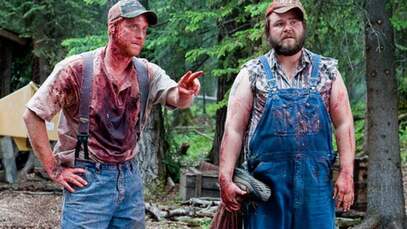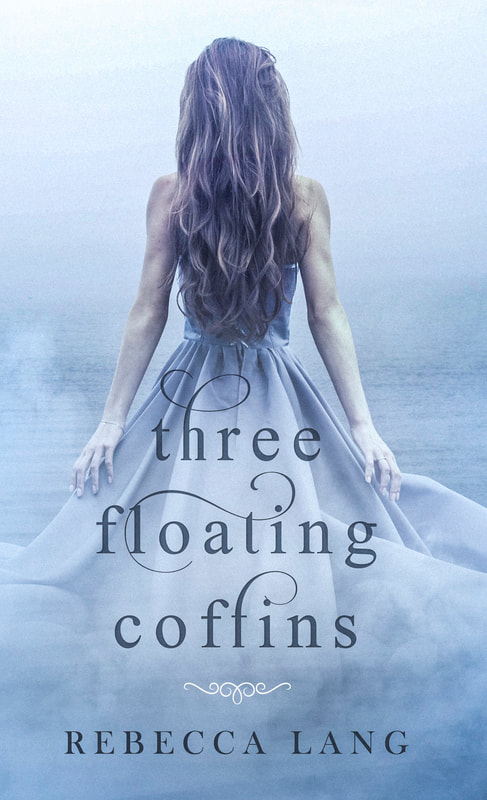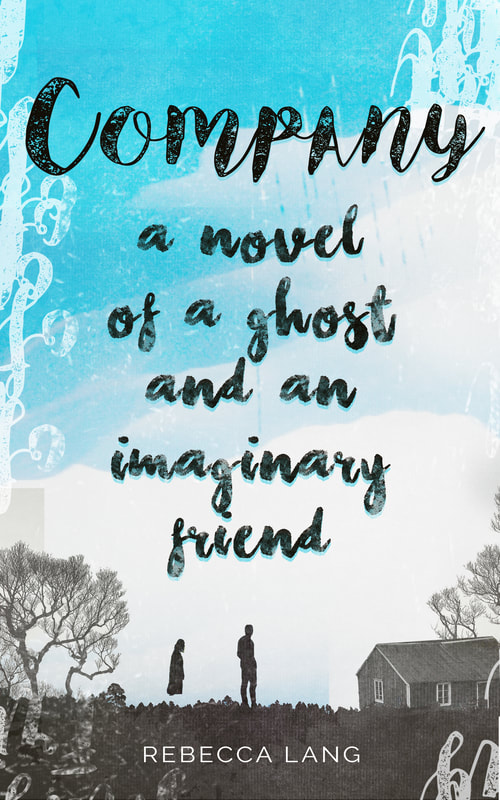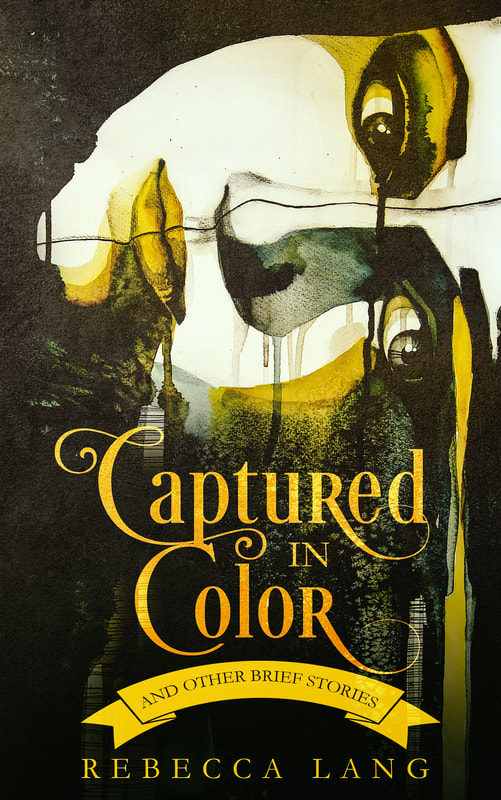|
Reading The Snow and the Darkness put me in a bad mood, so I decided to watch Tucker & Dale Vs Evil to cheer myself up. It’s a comedic riff on a hillbilly slasher movie, and it’s available on Netflix right now. I’ve watched it before, and I really love it, because it's clever and funny and leaves me feeling good. When a group of college kids travel deep into the Appalachian Mountains for a camping trip, they encounter a couple of hillbillies who occupy a creepy-looking cabin. It seems like the perfect set-up for a horror movie. However, the hillbillies turn out to be harmless. Pragmatic, beer-loving Tucker (Alan Tudyk) and hopeless romantic Dale (Tyler Labine) just want to renovate their “vacation home” and go fishing. When Dale rescues college student Allison (Katrina Bowden) from drowning, a series of misunderstandings lead the remaining college kids to believe that Tucker and Dale are psycho killers. Soon the bodies start piling up in violent, gory, and hilarious ways. Tucker & Dale is a kind of a parody movie, and I, personally, love parodies. They play with the conventions of genre, which I’m always a fan of. But whereas some parody movies are content to rest on laughs and not really bother with a story (I’m looking at you Scary Movie), Tucker & Dale Vs Evil delivers a well-written tale with fleshed out characters and plenty of heart. Also, it’s funny. Really funny. The humor, as I see it, comes from two major sources. The first is that the college kids, through a combination of misunderstanding, bad luck, and extreme stupidity, end up killing themselves and each other. This is played for laughs, and it works because the deaths are so extreme, they’re ridiculous. However, this humor is predicated on shock value, and it becomes less and less effective as the movie wears on. Fortunately, the second kind of humor is more consistent, as it relies on the charms of Tucker and Dale. They’re pretty funny from the start, but it’s their reaction to the extreme circumstances that’s particularly hilarious. Tucker and Dale are horrified and confused by the profusion of college kids “killing themselves all over [their] property.” This humor never lessens because it is rooted in character. It also helps that the actors are funny, especially, Alan Tudyk, who has excellent comedic timing. The humor peaks in the middle, during a brutally gory and hilarious scene, where two college kids manage to kill themselves right near Tucker and Dale. Our two heroes first react in shock and horror, and then come together to try and figure out what’s going on. They decide that the college kids must have some sort of suicide pact and realize that the dead bodies are going to make the two of them look pretty bad. Right in the middle of cleaning up, a cop arrives. It’s a scene that’s genuinely tense, and watching Tucker and Dale squirm is oh-so-delightful. But even if the humor declines somewhat after that second act, the story continues strong. As the college kids decide to “fight back,” Tucker and Dale struggle to survive. One college kid, meanwhile, is morphing into the titular evil. Will Dale find the confidence to become the hero and win the affections of the girl? Will Tucker ever get to have a beer and enjoy his vacation home? I won’t spoil the ending, but it is a happy one. Now as I was watching this flick for the hundredth time, I was thinking that, in order to be effective, Tucker & Dale has to make us care for the title characters very deeply and not care about the college kids at all--and it has to do both at the same time. As a writer, I find this a fascinating study. How do you make an audience care for certain characters? Likewise, what makes an audience stop caring to the degree that they actively root for the characters’ deaths? I have my theories. Let’s look at how the college kids are introduced. Eight of them are somehow crammed into a car, and they’re all (save for Allison) acting like vapid idiots. Case in point, as they nearly run into a red pick-up truck, one guy, Chad (Jesse Moss), calls the driver a freak, and when Allison corrects him, he says, “You’re either Omega Beta or you’re a freak,” which causes the guys in the car to start chanting “Omega Beta!” like a bunch of caveman. But the coup de grace is when a girl, with a horrified expression, exclaims, “We forgot the beer!” and everyone in the car screams. It’s such an exaggerated reaction, it makes it impossible to see the college kids as real people. They are, at best, interchangeable stereotypes. Now compare this to the scene where Tucker and Dale are introduced. Dale, while snacking on pickled eggs, stares at Allison and asks Tucker if he’s ever seen anyone like that. Tucker is unimpressed but encourages Dale to talk to her. When Dale expresses fear that Allison will reject him, Tucker tries to encourage him, first telling Dale that she’s just a human, then trying to hype him up by saying that Dale is good-looking, more or less, and that he’s got a damn good heart. Dale finally plucks up the courage to talk to Allison, and it goes horribly. He then sadly resigns himself to being a loser with the ladies. So, right off the bat, Tucker and Dale come across as far more relatable. Who hasn’t had a crush on someone and feared rejected? Not only do we get a sense for them as individuals, we can also see their relationship. Tucker may be rough around the edges, but he genuinely supports Dale and tries to help his friend with his confidence. As the movie goes on, we learn more about these men. Tucker has always dreamed owning a vacation home, and though the cabin he’s just bought is clearly the former lair of a serial killer, at least it was cheap, a real fixer-upper. He and Dale are so delighted with the purchase, I became invested in the fate of the cabin. Meanwhile, Dale finds himself with a chance to impress Allison, but he’s so awkward and shy around her, it’s endearing. Tucker continues to be supportive, even as things go horribly wrong. When the two argue, its more a reaction to stress than a sign of a rift in their friendship. By the end of the story, their relationship is stronger than ever. The college kids, on the other hand, never grow a personality, aside from Allison and, to some degree, Chad. Honestly, I’ve seen this movie several times and I couldn’t tell you their names or the first thing about them. They don’t actually seem to care about one another and are constantly sniping at each other. They certainly don't mourn each other's deaths or show any sign of compassion. They are easily led. They are stupid, but stupid in a very hollow way. You can have a character be stupid and still care about him. Dale, for instance, comes across as stupid at times, but this is a characteristic is based on his personality. Dale actually has a good memory, but a combination of low self-esteem, a lack of formal education, and a good-natured nativity makes him appear dumb. However, Dale is also kind and pure-hearted, which makes up for a perceived lack of intelligence. The college kids’ stupidity, on the other hand, is not a characteristic; rather, the stupidity comes from a lack of character. The kids do whatever the plot requires, with the bare minimum of humanity. They ignorantly jump to conclusions, fail to formulate a competent plan, scream and flail like idiots, and willfully walk into death. They are cannon fodder, and we know this, so we don’t invest in them. They die, and we laugh. Although I prefer to critique writing, it is worth noting that the acting for Tucker and Dale is waaay better than the acting on display for the college kids. The college kid actors play everything a bit too exaggerated, stilted, and one-note. I don’t know if this was intentional on their part or if the casting director chose bad actors. All I know is that I didn’t buy their performances. I did buy Alan Tudyk and Tyler Labine’s performances. Although slightly exaggerated for comedic effect, there is enough subtlety and nuance to make me believe that Tucker and Dale are real people going through a doozy of a day. I could go on, but you get the idea. It’s fun to analyze for yourself. What makes you care about a character? What makes you detach from them? Are there any other examples of these kinds of characters existing side by side? Let me know in the comments.
0 Comments
Leave a Reply. |
Rebecca LangWriter. Critic. Dreamer. Archives
January 2021
Categories
All
|





 RSS Feed
RSS Feed